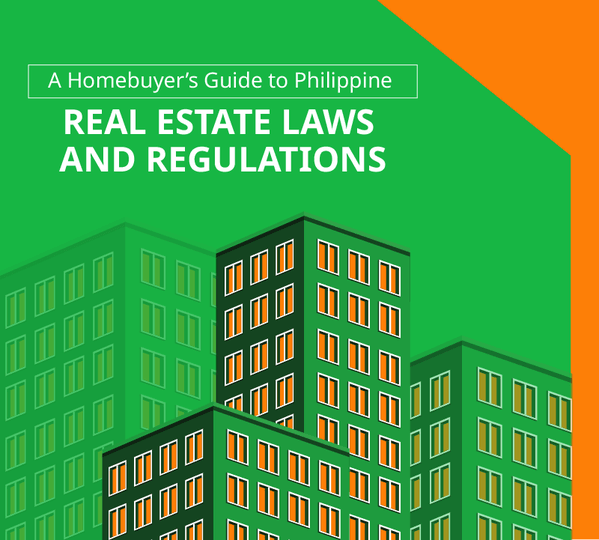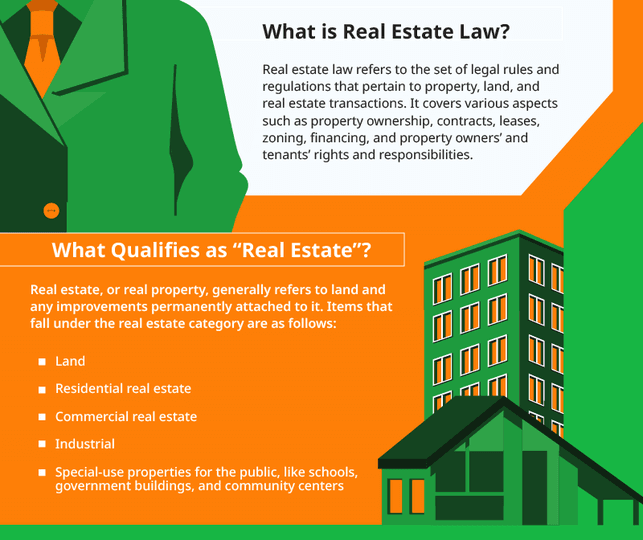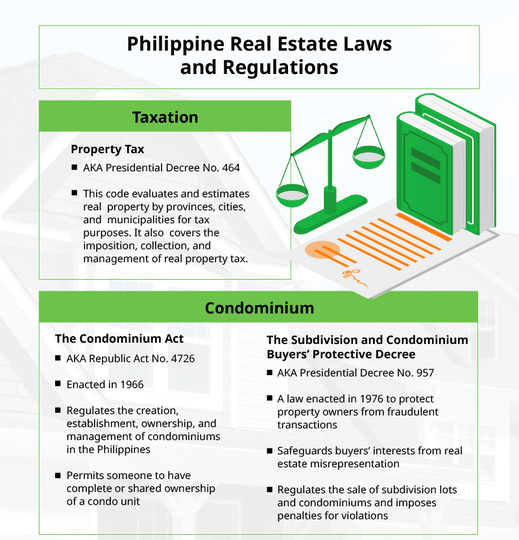Back to Property Buying Guide & Tips
A Homebuyer’s Guide to Philippine Real Estate Laws and Regulations
The real estate industry is thriving in the Philippines, presenting abundant opportunities for investors and property owners. The sector grossed roughly P536 billion in 2022 (1) alone, with no sign of slowing down.
However, understanding the legal framework governing property ownership and transactions can be quite complex for many.
As such, being knowledgeable about Philippine real estate laws and regulations is essential to acquire property in the country. Fortunately, this infographic tackles everything you need to know about real estate laws in the Philippines.
What is Real Estate Law?
Real estate, or property law, is the legal regulations and principles governing various aspects of real estate property. The primary purpose of this law is to establish and define the rights, responsibilities, and relationships between individuals and entities concerning real property.
Moreover, it’s a strategy to control the acquisition, use, transfer, and ownership of real estate and the various legal issues that may arise in these transactions.
What Qualifies as Real Estate?
Real estate typically refers to land, resources, and any permanent structures or improvements attached to it. Here is a list of what generally qualifies as real estate:
-
Land includes vacant land, plots, and parcels.
-
Residential properties refer to single-family homes, townhouses, condominiums, apartments, and other dwellings used for residential purposes.
-
Commercial properties include office buildings, retail stores, shopping malls, warehouses, hotels, and properties for business or commercial activities.
-
Industrial properties are structures like manufacturing plants, factories, distribution centers, etc.
-
Special use covers public real estate properties like government buildings, schools, and libraries.
Real estate definition and classification may vary depending on the jurisdiction and legal context. Some may have additional categories or specific descriptions for certain real estate types. Additionally, real estate can be further classified based on its intended use, location, or zoning regulations.
Philippine Real Estate Laws and Regulations
Several laws and regulations shape the Philippine real estate landscape, from property ownership to leasing agreements, development regulations, to buyer protection.
- Taxation
- Real Property Tax (Presidential Decree No. 464)
A law passed in 1974, Presidential Decree 464 (2) outlines the process regarding the value determination and appraisal of real estate to ease and properly distribute real estate taxes. Per this code, the basis of property assessment should include its usage, location, and current and fair market value.
Furthermore, assessment standards must be uniform regardless of location, and government bodies are the only ones authorized to conduct such activities. As such, no other third or private party can do these appraisals.
- Condominiums
- The Condominium Act
Otherwise known as Republic Act No. 4726 (RA 4726) (3), The Condominium Act came into law in 1966. It governs the creation, establishment, ownership, and management of condominiums in the Philippines. RA 4726 establishes the legal requirements for developing, registering, and operating condominium projects.
In addition, it details your rights and responsibilities as a unit owner, describes common areas, and includes information about the condominium corporation or homeowners’ association responsible for managing your property.
Under this law, foreign nationals may purchase condominium units but may not control the project on which the units are constructed.
- The Subdivision and Condominium Buyers’ Protective Decree
Alternatively referred to as Presidential Decree No. 957 of 1976 (4), this law aims to protect buyers of subdivision lots and condominium units in the country. The decree specifies that developers must provide you with accurate and transparent information.
The governing authority of this law is the Housing and Land Use Regulatory Board (HLURB), formerly the National Housing Authority (NHA). In the event of infractions on this law, the HLURB has the right to penalize the concerned real estate practitioners.
Plus, this law ensures you are fully informed about the project’s details, amenities, and development plans while addressing issues related to defaults, cancellations, and fraudulent practices to safeguard your interests.
- Lease and Rental
- Investors’ Lease Act
The Investors’ Lease Act, or Republic Act 7652 (5), facilitates foreign investments in the Philippines by allowing long-term private land leases to foreign individuals and entities. It provides guidelines and safeguards for lessors and lessees, allowing lease agreements for up to 50 years and renewable for 25 years.
This law ensures local law compliance and security for Filipinos while promoting foreign investment in the real estate sector.
- The Maceda Law
The Maceda Law, or the Realty Installment Buyer Protection Act (6), shields you as a real estate property buyer from installation payment issues.
Since 1972, the act has granted certain rights to buyers under the payment model, like missed payment grace periods, refunds for default payments, and the option to transfer the contract to another buyer. The primary purpose of the Maceda Law is to mitigate instances of installment payment schemes.
Suppose you have at least two years of installments with the developer or contractor. The law gives you a right to grace periods without incurring additional interest if you fail to pay subsequent installments.
For less than two years of installment, you are eligible for a 60-day grace period starting from the due date of the installment. If you fail to pay at the end of the grace period, the seller may issue a notice of cancellation for the contract 30 days after you receive the notice.
- Rental Reform Act of 2002
The Rental Reform Act of 2002, legally known as Republic Act No. 9161 (7), regulates residential and commercial lease agreements in the Philippines.
This law establishes and enforces guidelines concerning rent increases, eviction procedures, and tenants’ rights in situations such as foreclosure or an ownership change. RA 9161 aims to strike a fair balance between your and your landlord’s obligations and rights, ensuring a harmonious rental market.
The Rental Reform Act was revised three years later as the “Rent Control Act of 2005.” The revision included properties in urbanized cities, including the National Capital Region, with rent not exceeding P10,000 per month and those in other places where rent does not exceed P5,000 per month.
Only a 10% annual increase is permitted for any rental unit occupied by the same person or group. The lessor or owner can only set a new rental price when the property is vacated and the next lessee is ready to move in.
- Real Estate Services
- Real Estate Service Act (R.A. No. 9646)
Also known as RESA Law, RA 9646 (8) is a comprehensive legislation that controls the practice of real estate service professionals in the country. It was enacted in 2009 as a structured method to professionalize and ensure the competence, integrity, and accountability of individuals involved in real estate brokerage, appraisal, and consultancy.
More importantly, it establishes real estate service as a regulated profession, requiring aspiring or current practitioners to obtain the necessary licenses and registrations to engage in transactions legally.
- Foreign Investment and Ownership
- Foreign Investment Act (RA No. 7042)
Like the Investor’s Lease Act, RA 7042 of 1991 (9) actively promotes foreign investments in the Philippines by creating an enabling environment for international investors.
This legislation strategically provides incentives and relaxes restrictions in specific sectors to attract foreign capital. Moreover, it defines the structure for foreign ownership, establishes clear and transparent registration procedures, and ensures the protection of foreign investments.
- Anti-Dummy Law (Commonwealth Act No. 108, as amended)
The Anti-Dummy Law of 1975 (10) strengthens Philippine laws prohibiting foreign ownership of specific businesses or properties.
It bans dummy arrangements or schemes (11) where Filipino citizens or entities act as fronts that enable foreign individuals or organizations to control or own properties in Philippine jurisdictions. This law aims to maintain the integrity of Philippine regulations and protect national resources.
Achieve Real Success in Real Estate
Philippine real estate has been on an upward trend for the past decade. As such, more people are noticing and want to capitalize on the sector’s opportunities.
However, to succeed in this industry, it will take comprehensive knowledge of real estate laws and regulations to ensure your investment efforts are legally compliant and complication-free.
If you’re ready to invest in a townhouse for sale, OnePropertee can help. Our innovative platform provides you with thousands of property listings across the country. Check our website’s homepage and find your dream home today!
-
https://www.statista.com/topics/8509/real-estate-industry-in-the-philippines/
-
https://www.officialgazette.gov.ph/1974/05/20/presidential-decree-no-464-s-1974/
-
https://elibrary.judiciary.gov.ph/thebookshelf/showdocs/2/7243
-
https://www.officialgazette.gov.ph/1976/07/12/presidential-decree-no-957-s-1976/
-
https://www.officialgazette.gov.ph/1993/06/04/republic-act-no-7652/
-
https://www.officialgazette.gov.ph/2001/12/22/republic-act-no-9161/
-
https://www.officialgazette.gov.ph/1991/06/13/republic-act-no-7042/
-
https://www.sec.gov.ph/wp-content/uploads/2020/01/Anti-Dummy-Law-Commonwealth-Act-108.pdf
1 Like0 Replies-






















